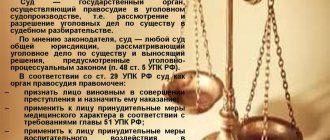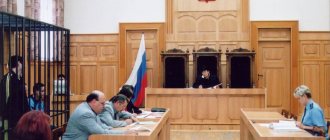Special procedure for considering a criminal case in court
So what is the special procedure for considering a case in court and how does it differ from the usual (general) procedure? The special procedure for trial is regulated by Chapter 40 of the Code of Criminal Procedure of the Russian Federation. This procedure means making a court decision (sentencing) without holding a trial, i.e. without examining the evidence presented by the prosecution and defense parties. Under this procedure, only materials characterizing the personality of the defendant, mitigating and aggravating circumstances are subject to consideration. According to Art. 315 of the Code of Criminal Procedure of the Russian Federation, the accused may submit a petition for a verdict without a preliminary trial after the completion of the preliminary investigation, when familiarizing himself with the materials of the criminal case, or at a preliminary hearing. The grounds for applying a special procedure for judicial proceedings are specified in Art. 314 Code of Criminal Procedure of the Russian Federation. They are: full recognition by the accused of his guilt in the charged crime, the consent of the accused with the charge brought, the presence of a petition from the accused for a verdict without a trial, the consent of the public prosecutor (prosecutor) and the victim with this petition and that the sanction of the article under which he is accused , did not exceed 10 years. However, even if all of the above conditions are present, the final decision to pronounce a sentence without a trial is made by the court, which may not satisfy the request of the accused (defendant) and consider the case in the general manner, i.e. with an examination of all evidence presented by the parties. Although in practice the courts willingly grant such requests, because with a special procedure for considering a criminal case, the time for considering the case is significantly reduced and there is no need to examine evidence or interrogate all participants in the trial. When considering a petition for the application of a special procedure for judicial proceedings, the court is obliged to find out whether there are conditions that prevent the application of a special procedure. In this case, the court must make sure that: 1. the accused (defendant) is aware of the nature and consequences of the stated petition, 2. the petition was submitted voluntarily, without any pressure and after consultation with the defense lawyer. If these conditions are not met, as well as if there are other obstacles, the court conducts a trial in accordance with the general procedure. Other obstacles include cases when the accusation brought is not confirmed by the case materials or the actions of the defendant are clearly given the wrong classification, or the classification of the crime raises doubts about its correctness and without a trial, without clarifying all the circumstances of the case, it is impossible to render a legal, reasonable and fair verdict. Therefore, if during the consideration of a criminal case in a special procedure, the court discovers obstacles to the adoption of such a verdict, it makes a decision to terminate the special procedure of the trial and appoints a consideration of the criminal case in a general manner. What are the features of passing a sentence without trial? What are its advantages in contrast to the general procedure for judicial consideration of a criminal case? Such a simplified procedure for considering a criminal case is in itself a mitigating circumstance, because it is carried out when the defendant fully admits his guilt and agrees with the charges, which indicates that the defendant repents of committing the crime. At the same time, according to Part 7 of Art. 316 of the Code of Criminal Procedure of the Russian Federation, the court cannot impose on the defendant a punishment exceeding 2/3 of the maximum term or the amount of the most severe type of punishment provided for the crime committed. In addition, as judicial practice shows, when considering a criminal case, courts in a special manner impose a more lenient punishment and more often apply Art. 64 (imposition of punishment below the lower limit of the sanction of the article of the Criminal Code of the Russian Federation) and Art. 73 of the Criminal Code of the Russian Federation (imposition of a suspended sentence). There is a small “minus” when passing a sentence without a trial (special procedure). This is the impossibility of appealing against such a verdict on appeal on the basis of a discrepancy between the court's conclusions in the verdict and the materials of the case, in other words, that the court's conclusions are not supported by evidence. However, for other reasons specified in Art. 380 of the Code of Criminal Procedure of the Russian Federation, as well as in cases of significant violations of the Code of Criminal Procedure of the Russian Federation, incorrect application of the criminal law, injustice of the sentence, such a sentence can be appealed.
Actions of the defense attorney during the consideration of a criminal case in the first instance
On February 5, Advisor to the FPA of the Russian Federation, member of the Council of the Moscow Administration, Ph.D. Evgeniy Rubinshtein gave another lecture on the course program “Practical aspects of the implementation of the Standard for defense counsel in criminal proceedings.” According to the press service of the Federal Chamber of Lawyers, the main part of his speech concerned the participation of a defense lawyer in the consideration of a criminal case in the court of first instance.
At the beginning of his speech, Evgeniy Rubinstein raised the issue of choosing the form of trial. He gave an example from practice demonstrating how the defense lawyer's lack of understanding of the jury trial format led to the defendant being unable to implement the tactics he had hoped for. The lecturer recommended that his colleagues think already at the stage of familiarization with the materials of the criminal case about the choice of the form of trial and the tactics that they intend to use when considering the case in court.
Speaking about the peculiarities of preparing a criminal case for a court hearing, he mentioned Resolution of the Plenum of the RF Armed Forces dated December 22, 2009 No. 28 “On the application by courts of the norms of criminal procedural legislation governing the preparation of a criminal case for trial.” In the context of the issue of returning the case to the prosecutor, Evgeniy Rubinstein recommended that his colleagues pay attention to the Resolution of the Constitutional Court of the Russian Federation of December 8, 2003 No. 18-P. His positions were subsequently reflected in the aforementioned Resolution of the Plenum of the Supreme Court No. 28. In particular, it states what is meant by violations of the requirements of the law committed when drawing up the indictment. The lecturer mentioned the signs of this disorder. First, it must be significant. Secondly, it is irreparable in a court hearing. Third, the violation must not be related to an issue of insufficient evidence.
General scheme of consideration of a case in an arbitration court
Stage 1: Filing a claim
The statement of claim is submitted strictly in the form established by law in writing; the statement must be signed by the plaintiff or his representative, or several signatures if the statement is submitted by several plaintiffs or their representatives.
The application must contain some mandatory details, a complete list of which is given in paragraph 2 of Article 125 of the Arbitration Procedure Code of the Russian Federation.
Note! Simultaneously with filing a lawsuit, the plaintiff must send by registered mail with notification to the other participants in the case copies of the statement of claim and all its attachments.
Within 5 days from the date of application, the court makes a decision either to begin proceedings, or to refuse to begin proceedings, or to leave the application without progress.
Stage 2: Preparing for the trial
Preparations for the trial are carried out by the arbitration court judge directly responsible for the case - at this stage, he studies the nature of the economic dispute and the circumstances essential to the case, decides on the composition of the trial, and creates the prerequisites for reconciliation of the parties.
Stage 3: Litigation (if the parties have not reached an amicable agreement or a decision has not been made to suspend proceedings)
The court, in accordance with procedural rules, notifies the parties of the time and place of the court hearing, during which all evidence and testimony are examined, after which the parties begin the debate.
Stage 4: Adjudication
After a comprehensive examination of the case during the trial, the court makes a decision on the case: either generally or separately for each of the plaintiff’s claims. The decision is drawn up in one copy and attached to the case materials, after which it is read out to the participants in the process.
Time limits for consideration of cases in arbitration courts
Today, the deadlines for making decisions on cases within the jurisdiction of arbitration courts are:
- In the first instance - no more than three months from the date the plaintiff applied to the court (this period includes the time to prepare the case for trial);
- The three-month period, if there is a reasoned appeal from the judge, can be extended to 6 months by the decision of the chairman of the arbitration court. Good reasons for extension: complexity of the case, large amount of documentation or participants in the process;
- Judicial proceedings may be postponed or suspended if there are objective reasons - the period of suspension in this case is not included in the above consideration periods.
What cases are most often considered in special proceedings?
Sometimes the court considers cases of so-called special proceedings, when a specific defendant is absent, that is, there is no dispute regarding the violated right. The procedure for considering such cases is regulated by Art. 262 Code of Civil Procedure of the Russian Federation. Typically, issues in the following areas of jurisprudence are considered.
- Adoption of a child.
- Establishment of a legally significant factor.
- Recognition of full legal capacity (emancipation) of a citizen who has not reached the age of majority.
- Recognition of a citizen after trial:
- or unknown absent;
- or dead;
- or “resurrected.”
- Declaring a person incompetent.
- Partial restriction of the legal capacity of a person who cannot independently solve his problems.
- Deprivation of a citizen aged 14-18 years of the right to dispose of income at his own discretion.
- Restoration of the right to dispose:
- order valuable documents;
- papers to bearer (meaning calling proceedings).
- forced psychiatric examination;
- sending to a psychiatric hospital.
This is not a complete list of cases studied during special proceedings. Other problems identified in Part 2 of Art. may also be considered here. 262 Code of Civil Procedure of the Russian Federation.







